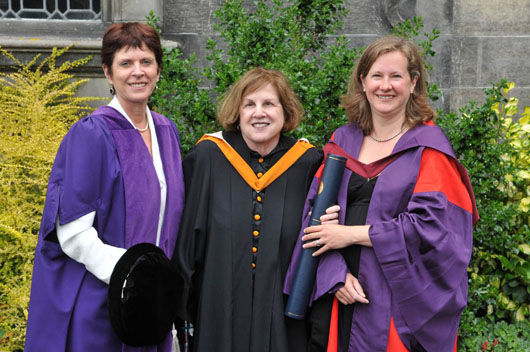Laureation Address – Professor Elaine Showalter
Professor Elaine Showalter
Honorary Degree of Doctor of Letters
Laureation by Dr Claire Whitehead
School of Modern Languages
Thursday 21 June 2012

Chancellor, I have the honour to present for the Degree of Doctor of Letters, honoris causa, Professor Elaine Showalter.
Elaine Showalter was born in Boston, Massachusetts in 1941. Against the wishes of her parents, who apparently disapproved of her intellectual leanings and ambitions, she read for a Bachelors degree in English at Bryn Mawr College, graduating in 1962. She received a Masters degree from Brandeis University in 1964 before earning a PhD from the University of California, Davis, in 1970 for a thesis entitled The Double Standard: Criticism of Women Writers in Victorian Periodicals 1845-1880. Her first academic position was in 1970 as an assistant professor of English at Douglass College, the women’s college of Rutgers University. She became an associate professor in 1974, a full Professor in 1978 before moving to Princeton University in 1984. There, she became Avalon Professor of the Humanities in 1987 and held this position until her early retirement in 2003.
Of course, if St Andrews were to award honorary degrees simply on the basis of enviable academic careers, there would be many more than two people sitting on this stage this morning. Rather, we have chosen to honour Elaine Showalter today not only as a highly-respected academic but as a pioneering writer, journalist, commentator and, in particular, as a ground-breaking feminist critic. As Professor Showalter has herself said, when she began to write her dissertation in 1965, feminist criticism did not exist. Her dissertation topic grew, in part, out of her anger at the undergraduate curriculum she had followed at Bryn Mawr where she remembers being obliged to read every tenth-rate male Romantic poet, but virtually no women writers.
Professional academic opportunities for women were still very limited: in the mid-1960s, for instance, Princeton (where she was an academic wife) would not hire female academics. Elaine Showalter became an active member of the women’s liberation movement in the late 1960s, and joined the newly-opened branch of the National Organisation for Women at Princeton in 1969. She also started to write for the journal Radical Feminism and had joined the advisory board of the Feminist Press which provided her with much inspiration and several important female role models. She began to envisage undertaking the sort of feminist criticism which would do for the history of women’s writing what Northrop Frye had done for Canadian literature or what Perry Miller had done for American literature. And as I stand in front of you this morning, I can confidently say that she has achieved not just this, but so much more.
Elaine Showalter is the author of some twenty books, many of which are seminal works in feminist literary criticism. These include: A Literature of Their Own: British Women Novelists from Bronte to Lessing from 1977; The New Feminist Criticism from 1985; The Female Malady: Women Madness and Culture, also published in 1985; Sexual Anarchy: Gender and Creativity in the Fin-de-Siecle from 1990; and A Jury of Her Peers: American Women Writers 1650-2000, from 2009.
Not only did she broaden the canon to include works by women but Professor Showalter also introduced methodological tools for better understanding how such works function in contrast to texts by men, tools which defined the field and are still much used today. She has also written a study of the American academic novel, entitled Faculty Towers and a reflective account of her experience of teaching undergraduates, entitled Teaching Literature. She is also the author of more than 100 scholarly articles, 250 reviews, has given more than 300 invited lectures and held numerous editorial positions. Over the years, Elaine Showalter has become an increasingly sought-after cultural commentator and adjudicator: she has been a judge for the National Book Awards, the Orange Prize for Fiction, the PEN awards, and in 2007 was the Chair of Judges for the Man Booker International Fiction Prize.
And even now, nearly ten years into retirement, Professor Showalter shows no signs of slowing down. She continues to be a very active public intellectual, appearing regularly on BBC television and radio, and continues to win prizes: she has just been awarded the Truman Capote prize for Literary Criticism for her book A Jury of Her Peers. And her current project is a biography of Julia Ward Howe, who is most famous as the author of The Battle Hymn of the Republic, but was also a suffrage activist and public figure after the American Civil War.
Chancellor, in recognition of her significant contribution to academic and cultural life and criticism, I invite you to confer on Professor Elaine Showalter the Degree of Doctor of Letters, honoris causa.
Category Awards